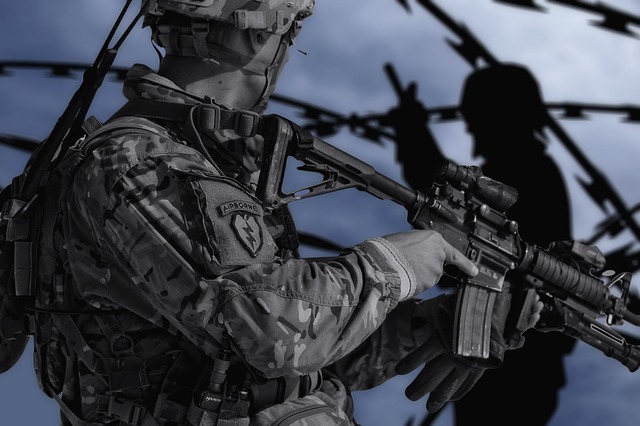“That a man can take pleasure in marching in formation to the strains of a band is enough to make me despise him.” —Albert Einstein
Joseph Heller published his epochal novel sixteen years after the end of World War II, having afforded himself a humane interval during which all the horrific bloodshed, nationalism, and bloodthirsty ideologies could fructify in the dust of the greatest boneyard that had ever existed. The euphoric and irreverent heights of black comedy had never been attempted with so merciless and unsparing a wit, applied to the great era of modern warfare, the twentieth century. This novel could be said to constitute the novel of modern warfare; although it was released to the ambiguous appraisal of the critics, some of whom took offense at its many brickbats and no-holds-barred excesses, the novel has long remained provocative, subtle, risible, and hilarious, a brilliant cornerstone of twentieth-century literature.
The title of the novel, Catch-22, is the ingenious and germinal motif that has entered the English language, generally as a term denoting a problem with solutions precluded by some condition inherent to the problem itself, or to the circumstances of the problem. The ingenuity of Catch-22 derives from the sodden atmosphere of the wartime island of Pianosa, entrancing everyone with a circular logic that extends to the era itself; those who are alive during this hellish insanity are themselves insane, because they have to be, perpetuating what is the insanity to which they have become victims.
Although the motif underlies many moments of the story, its first shameless appearance is near the beginning, when the narrator reveals that “there was only one catch and that was Catch-22, which specified that a concern for one’s own safety in the face of dangers that were real and immediate was the process of a rational mind. Orr was crazy and could be grounded. All he had to do was ask; and as soon as he did, he would no longer be crazy and would have to fly more missions. Orr would be crazy to fly more missions and sane if he didn’t, but if he was sane he had to fly them. If he flew them he was crazy and didn’t have to; but if he didn’t want to he was sane and had to.”[1]
This straitjacket of Catch-22 makes the subtle point that not having to fly only occurs when one is already flying, giving rise to the inevitable conclusion that one cannot not fly. It is the terrible entrapment of the absurdity of circular logic, wartime bureaucracy, and a conditional insanity entailing that everyone falls in line, because no one cannot fall in line. One senses the possibility of a point of no return existing in the distant past, when this absurdity could have been deflated by some brave soul, but by the time of the setting of Catch-22, that point has long since disappeared. What remains is a functional madness, or a functionality-to-the-point-of-madness. And it is luminous.
The cast of characters is an unforgettable potpourri of foolishness and absurdity. Pianosa is a mixed bag of men exhibiting neuroses and hang-ups, foibles and vices, which are as delightful as they are effective in bringing out the distasteful hypocrisy encouraged by the wartime vacuum of Catch-22. A memorable exemplar of these foibles and delights is Lieutenant Scheisskopf, whose hobbyhorse is the winning of parade awards, distributed by those officers among whom the “bloated colonel with a big fat mustache” is lord over all.
These awards consist merely of a yellow pennant on a pole for the best wing squadron, and a red pennant on a longer pole for the best overall squadron. Lieutenant Scheisskopf, his parade mania whirling, carries out a dauntless gambit that has been his own ingenious invention: the introduction of the swingless march. Its exhibition reveals Lieutenant Scheisskopf as the starlet of Pianosa, the king of parades—but one had better defer to the action itself:
“Lieutenant Scheisskopf unveiled his epochal surprise that Sunday with all the aplomb of an experienced impressario [sic]. He said nothing while the other squadrons ambled past the reviewing stand crookedly in their customary manner. He gave no sign even when the first ranks of his own squadron hove into sight with their swingless marching and the first stricken gasps of alarm were hissing from his startled fellow officers. He held back even then until the bloated colonel with the big fat mustache whirled upon him savagely with a purpling face, and then he offered the explanation that made him immortal. ‘Look, Colonel,’ he announced. ‘No hands.’”
Of the many characters eliciting guffaws and amused disbelief, The Chaplain and Major Major Major Major are the most mawkishly pathetic (and therefore the most ridiculous). The character of Major Major also touches on the brilliance of paradox and circular logic that makes Catch-22 what it is: “Major Major had been born too late and too mediocre. Some men are born mediocre, some men achieve mediocrity, and some men have mediocrity thrust upon them. With Major Major it had been all three. Even among men lacking all distinction he inevitably stood out as a man lacking more distinction than all the rest, and people who met him were always impressed by how unimpressive he was.”
This solitary and hapless mediocrity vies with The Chaplain, whose self-esteem is more tenuous than Major Major’s and who is the greatest milksop on Pianosa. Different nonetheless from Major Major, The Chaplain, like the protagonist Yossarian, is an incredulous victim in a lion’s den of circular logic and immorality; but the Chaplain differs from Yossarian because of his groveling religious piety, whose legitimacy Yossarian has long since cast off as being one more absurdity in a world of absurdities.
The end of Catch-22 bears out this difference of worldviews: His religious fervor reignited by the news that Orr has made it to Sweden, The Chaplain reaffirms the “perseverance” that will carry him through the slough of Pianosa, while Yossarian, who has long understood the futility of everything, takes matters into his own hands and acts in order to save himself—or whatever remains of the shrapnel of a tired, demoralized human being.
A sphinxlike human being, another memorable character is Major —- de Coverley, who spends most of his time playing horseshoes, as well as setting up officer’s apartments in Rome. His appearance is that of a “splendid, awe-inspiring, grave old man with a massive leonine head and an angry shock of wild white hair that raged like a blizzard around his stern, patriarchal face,” and he inspires so much fear in those with whom he never associates that he remains throughout the story a silent sentinel and emblem for the irreverence with which Heller treats the military establishment.
A running set piece of the story is the incurable and merciless publicity-seeking for which Colonel Cathcart is willing to do almost anything. His continual strategy is to raise the number of missions, whose increase he associates with a hazy distinction leading to what he hopes is publicity and promotion to the rank of General. This raising of missions continually thwarts Yossarian’s undying hope to rid himself of the war altogether, and he often feigns sickness (and an almost-jaundice) in order to free himself of his duties as bombardier:
“‘Forty missions,’ Hungry Joe announced readily in a voice lyrical with relief and elation. ‘The colonel raised them again.’ Yossarian was stunned. ‘But I’ve got thirty-two, goddammit! Three more and I would have been through.’ Hungry Joe shrugged indifferently. ‘The colonel wants forty missions,’ he repeated. Yossarian shoved him out of the way and ran right into the hospital.” The inescapable missions, ballooning with the self-serving caprice of Colonel Cathcart, are the bane of Yossarian’s residency on the island, and yet another instantiation of the elliptical and elusive bonds of Catch-22.
The man of capitalism and enterprise, and thus of avarice and inhumanity, is Milo Minderbinder, whose M&M Enterprises is the transcontinental syndicate of which everyone has a share. But Milo is a ruthless entrepreneurial genius, and his business activities are never as they appear: “Milo chortled proudly. ‘I don’t buy eggs in Malta,’ he confessed, with an air of slight and clandestine amusement that was the only departure from industrious sobriety Yossarian had ever seen him make. ‘I buy them in Sicily for one cent apiece and transfer them to Malta secretly at four and a half cents apiece in order to get the price of eggs up to seven cents apiece when people come to Malta looking for them.’”
Whenever the narrative returns to Milo, his syndicate seems to have grown, and the complexity of his industry becomes unfathomable and hilarious: “France wants all the parsley we can send them, and I think we might as well, because we’ll need the francs for the lire for the pfennigs for the dates when they get back. I’ve also ordered a tremendous shipment of Peruvian balsa wood for distribution to each of the mess halls in the syndicate on a pro-rata basis.’ ‘Balsa wood? What are the mess halls going to with balsa wood?’ ‘Good balsa wood isn’t so easy to come by these days, Colonel. I just didn’t think it was a good idea to pass up the chance to buy it.’”
His greatest transgression of civility and humanity is the bombing of his own encampment on Pianosa; this absurd treachery and violence appears to be the end of Milo—until it is discovered that his bombing generated a windfall, and he is honored with special exemptions and liberties guaranteeing the continuance of M&M Enterprises. Nothing at all is sacrosanct or inviolate in this world of rapacity.
That everything may be nothing at all comes when Yossarian travels for the last time to Rome, where he experiences—in visions and fancies that are all-too-real—the harrowing repercussions of war. Walking through a lawless, violent phantasmagoria of nightwalkers and victims, Yossarian experiences an underworld bringing home the utter chaos that has resulted from such bywords as Catch-22: “On squishing straw sandals, a young woman materialized with her whole face disfigured a God-awful pink and piebald burn that started on her neck and stretched in a raw, corrugated mass up both cheeks past her eyes! Yossarian could not bear to look, and shuddered. No one would ever love her.” This imagery, occurring near the end of the book, signifies the shift in tone careering from black comedy to the over-the-top sobriety of a hopeless, bombed-out city representative of many other cities in wartime.
The tone carries over to the gunner, Snowden: on one of the many missions to which Yossarian was assigned, Snowden lay dying in the sunlight, whimpering, his entrails spilling onto the floor where another gunner had swooned: “Yossarian was cold, too, and shivering uncontrollably. He felt goose pimples clacking all over him as he gazed down despondently at the grim secret Snowden had spilled all over the messy floor. It was easy to read the message in his entrails. Man was matter, that was Snowden’s secret. Drop him out a window and he’ll fall. Set fire to him and he’ll burn. Bury him and he’ll rot, like other kinds of garbage. The spirit gone, man is garbage. That was Snowden’s secret.”
The reduction of man to matter, to garbage, is the nihilistic summation of the wartime values underlying Catch 22 and the behavior of these many characters. What is man? He is garbage, but very serviceable garbage furnishing the means to other means that have no ends. This is the barren, nihilistic insanity of Catch 22: man is a means without an end. Even suffering and death are absurd, empty, meaningless.
The import of these conclusions, presented by the author without any alternative, is unsettling, but the conclusion of Catch-22 furnishes the possibility of a resolution. Yossarian, having discovered that Orr has made it to Sweden, at last commits himself to escaping on his own terms. Unlike the Chaplain, whose desperation seizes the survival of Orr as a bogus miracle reigniting his belief in God, Yossarian has seen too much, and he chooses to save himself. He is going to Sweden: “Yossarian laughed with buoyant scorn and shook his head. ‘I’m not running away from my responsibilities. I’m running to them. There’s nothing negative about running away to save my life.’”
Yossarian has thus chosen his own responsibilities over those of a society that has none. Recognizing that the excessive realities of Catch-22 are near those of our own society, in spite of their excessiveness, one could reasonably conclude that responsibilities are always those of the individual, even if one resolves none of the quandaries of Catch-22. For the madness of any group of human beings is not ameliorable; society is far from perfectible; and the sovereign, perfectible individual gives rise to the many individuals withstanding, or creating, the monstrosity for which none of them is responsible. That truly is madness. Hapless, dazed, downtrodden, escaping with his life, Yossarian is doing what he long since should have done.
- Heller, Joseph. Catch-22. Random House, Inc., 1955. ↑



